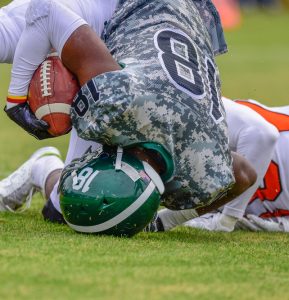Concussions are the most common traumatic brain injuries and can vary from mild to severe. While many people recover from a concussion with little to no issue, for others a concussion can cause lasting effects that change the way they live. When a concussion is caused by someone’s negligence—for example, in a car accident, a preventable fall, faulty or malfunctioning products, or premises liability, you are entitled to financial compensation for your medical costs, pain and suffering, and any lost wages and earning potential. An experienced concussion injury lawyer at Regan Zambri Long is experienced in head injuries and traumatic brain injuries and can help you claim the compensation you deserve for your concussion.
Contact Us Today to Schedule
A Free Consultation
Even a mild concussion is a kind of traumatic brain injury and it should be taken seriously, from the medical care you seek to the compensation you recover. It is common for concussions to happen as a result of someone’s negligence, and when that is the case the concussion and brain injury lawyers at Regan Zambri Long PLLC are on your side to fight for your rights.
A concussion is a kind of traumatic brain injury caused by a sudden movement that shakes or bounces the brain around the skull. Though often not life-threatening, concussions are still traumatic brain injuries and need to be treated as such. Someone with a head injury might display any or all of the following signs:
Additionally, someone with a brain injury is likely to experience post concussion headaches, nausea, balance problems, dizziness, blurry vision, noise and/or light sensitivity, and sluggishness. A head injury can take time to reveal its seriousness, so it is important to seek medical attention quickly and to continue monitoring the injured person for worsening or increasing signs and symptoms.

Any kind of head injury can result in a concussion. One pervasive myth about concussions is that you must hit your head to have a concussion. However, since a concussion results from the brain shaking in the skull, any accident or event that jars or shakes your body or head can result in an injury. Brain injury symptoms can take up to 48-hours to manifest, so it is not enough for the injured person to say that he or she feels fine. Common causes of these mild traumatic brain injuries include:
Car accidents are a major cause of concussions. Even when seat belts and airbags function properly, the impact of a collision jars the body and can easily cause both mild and severe concussions. Even if your head doesn’t hit anything, the whiplash experienced during the accident can often be enough to cause a concussion.
Motorcyclists, bicyclists, and pedestrians are at more risk to experience a brain injury when involved in an accident—either with another vehicle or a non-moving object— because less protection is available to them.
Concussion injuries are common occurrences in many kinds of sports and recreational activities.
Contact sports such as football, hockey, and soccer are obvious culprits for ports concussions, but sports such as basketball, baseball, and softball also see significant numbers of brain injuries each year.
Even non-contact sports and recreational activities can cause concussions. Playground falls, exercise accidents, and skiing accidents can result in mild to serious concussions.
Most of us don’t immediately seek medical attention when we slip, fall, or trip, but these kinds of accidents can be some of the most common sources of unreported concussions. While negligence may not factor into all of these accidents, if a hazard caused your slip, trip, or fall, you may be entitled to compensation. Whether your fall occurs at work or during daily life, you should always pay attention to what symptoms you experience afterward and seek medical attention if your symptoms persist.
An estimated 1.6-3.8 million concussions occur in relation to sports or recreational accidents each year in the United States. This is of particular concern for young athletes because children’s brains are still developing and, if a concussion isn’t treated correctly, can cause permanent damage.
Many people might think that if they aren’t playing a contact sport they don’t need to worry about concussions, but many other sports cause concussions, including baseball/softball, volleyball, wrestling, lacrosse, and cheerleading. The CDC reports that 70 percent of athlete concussions are caused by player-to-player contact and 17 percent are caused by player-to-surface contact.
Understandably, athletes of all ages resist sitting on the bench after an injury. But coaches have a duty to protect their athletes, even when that means pulling the athlete from the game. If a coach fails to take a potential concussion seriously or pressures an athlete to continue playing when he or she is injured, the coach could be found negligent and held liable for any complications the athlete experiences during recovery.
If your child plays any sports—whether for school or a separate league— you have a responsibility to fight for your child’s health by keeping him or her out of the game until a doctor has cleared him or her to play.
If you or a loved one suffered a brain injury that was the direct result of someone’s negligence, you may be able to file a personal injury lawsuit to recover compensation for your medical costs, suffering, and any lost wages or earning potential.
Unfortunately, claiming compensation is easier for some injuries than others.

For head injuries sustained during sports, you will want to consult with an experienced concussion or brain concussion injury lawyer right away. In some cases, you may not be eligible for compensation because no one was negligent. When you engage in certain activities, you are assumed to know and accept certain risks. Assumption of risk is often represented by a waiver that releases an organization or individual from liability in the event of an accident because the risk of injury is known and participation is voluntary.
Just because you or a loved one was injured when assuming a risk doesn’t mean you shouldn’t think about compensation, however, because some circumstances may involve negligence. If the injury was intentionally inflicted by another player or participant, the district or league might be held liable for allowing or ignoring excessive force or aggressive behavior in a player. If it can be proved that the injury was intentional, you may be able to hold the player personally liable, as well.
If a coach has failed to train players to protect themselves from common occurrences, such as tackling in football or collisions in hockey or soccer, the coach may be considered negligent and therefore liable for preventable injuries. Additionally, if a coach calls a player to return to the game instead of taking a potential head injury seriously or without allowing a full recovery period, you may have grounds to sue for negligence.
Unfortunately, several pervasive myths can cause people to dismiss a concussion and thereby be at greater risk for complications or long-term effects.
Losing consciousness is not a sign and symptom of every concussion. Even if someone does lose consciousness due to a concussion, it does not always signify that the concussion was more severe.
Though head trauma does cause many concussions, any accident that sufficiently shakes or jars your body can lead to a concussion. An abrupt bump or jolt to your body, such as falling down the stairs, can cause a concussion even if your head didn’t make direct contact with anything.
It can take hours or even days for symptoms of a concussion to show. Even if some symptoms, such as headache or dizziness have come and gone, other symptoms could be delayed. Even if you don’t experience symptoms immediately, you may still have a concussion.
Since symptoms can take time to manifest, you should take it easy until you have been medically cleared. Whether it’s work or a sport, engaging in the activity before fully recovering—even if you feel OK—can lead to complications later on.
If you or your loved one has suffered a concussion due to someone’s negligence, it is important to be wary of these myths. An experienced traumatic brain injury lawyer can help you recover the compensation you are due.

Any accident that involves head injury—whether it’s bumping or banging your head or a full-body impact—can cause a concussion. Additionally, any accident that is significantly jarring or causes whiplash, even without direct head trauma, can lead to a concussion.
Car and motorcycle accidents, bike and ATV accidents, assault or domestic violence, and professional sports such as football, hockey, or soccer are some of the most common causes of concussions. Slips and falls can also cause a concussion, if your head hits the ground or another object with enough force or if you experience significant whiplash. Many work-related concussion accidents result from slipping or tripping and falling.
Someone with a concussion will experience some or all of the following symptoms:
If a concussion is very severe, the victim may experience difficulty with memory, thinking, coordination, speech, hearing, vision, and mood swings. This in turn can pose challenges with personal relationships, getting or keeping gainful employment, daily routines, and general quality of life.
Some people will experience post-concussion syndrome, where some of the symptoms of the brain trauma linger for months after the initial injury.
A one-off accident that causes a concussion might not cause long-term effects, but multiple head injuries can compound the symptoms. Particularly for athletes of all ages, returning to the game before fully recovering or sustaining multiple concussions (with or without a full recovery between injuries) increases the risk of permanent damage to the brain. Second impact syndrome and chronic traumatic encephalopathy (CTE) are two conditions linked with multiple concussions and both can be serious.
Most mild concussions heal on their own and only require monitoring. But sometimes symptoms linger after the expected recovery period, leading to persistent post-concussive symptoms (also called post-concussive syndrome). The lingering symptoms include headaches, dizziness, and impaired concentration and memory functions. Though they usually go away within three months, sometimes symptoms can last a year or longer.
You should seek medical attention for any injury that results in confusion or memory loss, even if you did not lose consciousness. If you experience several concussion-related symptoms you should seek medical attention.
However your concussion happened, we believe that the liable party or parties should be held accountable. Our team has recovered millions of dollars for brain injury clients, including a $6.2 million recovery for a skiing accident that is the largest verdict rendered in Albemarle County,Virginia, and the largest verdict upheld against a ski operator in the country.
Justice shouldn’t be hindered by money, so Regan Zambri Long works on a contingency basis, meaning you don’t pay any legal fees until we’ve won a recovery in your favor. We focus on justice so you can focus on recovery.
Schedule your free case evaluation today by calling 202-960-4596.